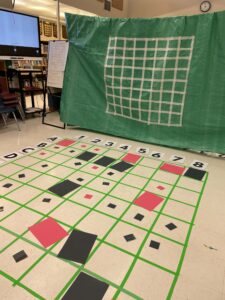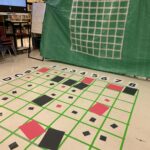In a world where equations are the keys to innovation, Pinnguaq embraces creativity as we support the development of STEAM skills across communities and classrooms.
“Math shows up in our everyday lives so much more than we realize,” says Emily Coombes, Digital Skills Educator with Pinnguaq.
Coombes and her colleagues are consistently striving to build engaging lessons and activities for learners of all ages. During a recent trip to an elementary school classroom, this included a drone planting activity.
The activity saw learners code an animation of a drone scanning a field and dropping seeds. As the drone drops the seeds, relying on the coding work of the students, the learners watch the seeds grow to a seedling, a young tree and then a fully grown tree.

This drone planting activity teaches learners about mathematical concepts such as the Cartesian Plane and coordinate mapping… neither of which sound very exciting.
“When we’re teaching kids using games and we’re playing with them, they don’t realize that they are learning. We can get through a whole lesson talking about the Cartesian Plane, and coordinates, and the kids understand what we’re doing, but they don’t make the connection that they are both practicing math they already know and are learning more math that they may not have known yet,” says Coombes.
“Even something as simple as being able to identify that in Battleship we need to identify the letter and then the number is teaching them that paired coordinates have to be given as the X coordinate (the letter) and then the Y coordinate (the number). Kids become more aware of the space that their body is taking up, and are able to relate their location to their classmates through the number of squares that are between them in each direction.”
Whether you’re calculating the perfect tip at a restaurant, planning a roadtrip or playing a competitive game of Battleship, math is the key. At Pinnguaq, we encourage learners to embrace the power of numbers to streamline their daily tasks, boost their problem-solving skills, and unleash their full potential.
Classroom visits and other programs are made possible by funding from Innovation Science and Economic Development (ISED) Canada’s CanCode program.

